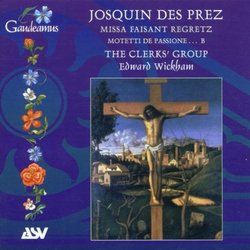| All Artists: Josquin Desprez, Walter Frye Title: Josquin dez Prez: Missa Faisant Regretz; Motets Members Wishing: 0 Total Copies: 0 Label: Gaudeamus Release Date: 3/26/2002 Genre: Classical Styles: Opera & Classical Vocal, Historical Periods, Early Music Number of Discs: 1 SwapaCD Credits: 1 UPC: 743625030228 |
Search - Josquin Desprez, Walter Frye :: Josquin dez Prez: Missa Faisant Regretz; Motets
 | Josquin Desprez, Walter Frye Josquin dez Prez: Missa Faisant Regretz; Motets Genre: Classical
|
Larger Image |
CD Details |
CD ReviewsPerfection, Pure and Simple! Giordano Bruno | Wherever I am, I am. | 11/07/2008 (5 out of 5 stars) "The weather must have been as fine as the first day of Creation in West Wratting, England, on the 14th-16th of March, 2001. The air must have been clean of all pollution and pollen. Nothing else can explain the cerulean clarity of the six voices on this recording, all six voices as pure and bright as sunlight through stained glass. The Clerks' Group is always good, but this CD is transcendently good, the best performance of music by Josquin I've ever heard. It should be enshrined for all choirs and vocal ensembles as the template of how Renaissance polyphony should be sung.
Josquin's Missa Faisant Regretz is a small mass, only 20 minutes in length, constructed entirely on a four-note theme - E>CB in various transpositions - taken from the earlier chanson by Walter Frye, titled Tout a par Moy. That chanson is recorded here also, and it's a splendid example of the changes in polyphonic composition, to hear the exuberant but meandering chanson followed by Josquin's elegantly concise and tighly shaped mass. The phrase "faisant regretz" - "feeling regret" - comes from the middle of Frye's chanson, and sets the tenor of the mass as penitential, but the most confidently optimistic penitence you'll ever hear. The other forty minutes of this recording are devoted to five motets by Josquin, from the collection "Motetti de Passione - B" printed in 1503 in Venice by Ottaviano Petrucci, the 'Gutenberg' of music. Petrucci's Odhecaton was the first publication of music printed from movable type; without Petrucci, it's fair to say that we'd be poorer by dozens of compositions by Josquin and his great contemporaries. Petrucci was not only an artisan but also a marketing genius. His music publications, of which 61 have survived, were not intended to compete with the sumptuous illuminated manuscripts collected by the super-wealthy, but rather to be sold to the rising bourgeoisie, for domestic performance by skilled dilettantes, both singers and instrumentalists. Thus the motets chosen for Motetti A and Motetti B, including many by Josquin, are musically distinct in idiom from the masses. They are more homophonic (composed of harmonies in rhythmic unison or near unison) and more 'accessible' to untrained music lovers, then and now. That's not to say they are musically inferior. In some ways, Josquin's use of homophony is ahead of his era -- emotionally potent and direct, a herald of the ideals of the early Baroque. 20th C musicologists once upon a time supposed that such 'simple' compositions must have been early works by Josquin, while he was still learning his craft. That wasn't so, as anyone who HEARS this music sung with the supreme artistry of the Clerks' Group will immediately realize, even if the listener is musically illiterate. Josquin, of all Renaissance composers, could write great music in any form and any style he chose." |

 Track Listings (11) - Disc #1
Track Listings (11) - Disc #1